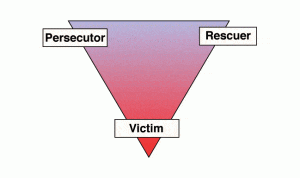The Drama Triangle
By Kevin Leapley, MA, LPC, CSAT on Saturday, December 26th, 2015 in Sexual Addiction. No Comments
Often in relationships where addiction is present, the couple will play a rotating roles of “Persecutor/Perpetrator”, “Victim”, and “Rescuer”. This is is called a “Drama Triangle.” These are roles that both the partners learned in childhood as normal and each don’t recognize the drama that occurs and the cycle of dysfunction that never seems to improve. These roles as children are often necessary to survive and kept the individuals in the family safe. Yet as the individuals matured and grew into adults, the roles can actually keep them stuck in the cycle of drama rather than safe.
Psychiatrist Stephen Karpman developed the Karpman Triangle, sometimes called the “drama triangle,” to explain the unhealthy dance played out in the relationship with addiction. Our counselors will often use this triangle in counseling to help show what happens when the couple becomes disappointed in the relationship and how their drama comes from playing three different roles:
- Victim/martyr – This role is about feeling victimized by the other partner or others outside the relationship by what he/they are doing or not doing. Often unrealistic expectations, despair, vulnerability, powerlessness, and repeated disappointment are the outcome. Partners that often communicate in a passive manner are often victims or martyrs. The position is “its not my fault but the fault of the persecutor” or “my life would be better if someone would rescue me from my husband.”
- Persecutor/Perpetrator – This person represents the one with all the power in the relationship and acts out in order to get back at the other partner. He/she often feels shame for the things he/she says, does, or doesn’t say or do in the relationship. This role allows the person to feel powerful, in control, and often communicates in an aggressive way.
- Rescuer – this person is a natural rescuer/caretaker, willing to keep secrets, is passive and non-confrontational, and is an enabler of the addictive behaviors. These can be neighbors, family members, coworkers, friends, or even often therapists that are not trained in the family systems of addiction. The Rescuer will also feel superior to both the persecutor and the victim.
This drama triangle doesn’t require a person to just play one of the roles all of the time but rather the roles will constantly rotate. The Victim will blame the Perpetrator (i.e. having an affair) for his/her depression and anger but will also look to that person to rescue (i.e. “if you would just stop having affairs and work your recovery, then I can finally be happy.”). The Perpetrator role can quickly switch to playing the Victim role (i.e., “if you would show me more respect and love, then I would never have had to have the affair.”). These roles are acted out repeatedly in relationships with the goal of each to meet his/her own needs and wants as modeled in his/her own family-of-origin. The cycle continues into other relationship until one recognizes the dysfunction of these roles and begins to choose a healthier path of getting one’s needs and wants met in relationships.
Kevin Leapley, MA, LPC, CSAT
Latest posts by Kevin Leapley, MA, LPC, CSAT (see all)
- Relationship Panic & Attachment - September 18, 2018
- Anger Management Coping - January 22, 2017
- How Do People Behave In Anger - December 31, 2016
- Anger Management Distortions: Overgeneralization - December 3, 2016
- Two Basic Traits That Help Relationships Last - November 22, 2016
